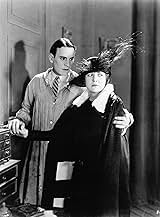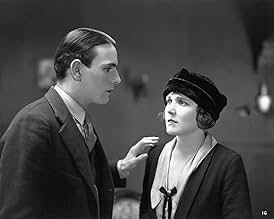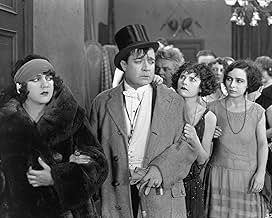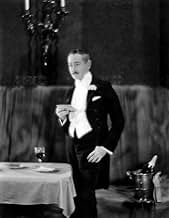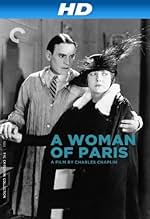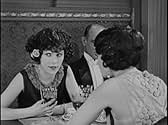IMDb RATING
6.9/10
6.6K
YOUR RATING
A kept woman runs into her former fiancé and finds herself torn between love and comfort.A kept woman runs into her former fiancé and finds herself torn between love and comfort.A kept woman runs into her former fiancé and finds herself torn between love and comfort.
- Awards
- 3 wins total
Charles K. French
- Jean's Father
- (as Charles French)
Nellie Bly Baker
- Masseuse
- (uncredited)
Henry Bergman
- Head Waiter
- (uncredited)
Charles Chaplin
- Station Porter
- (uncredited)
Frank Coghlan Jr.
- Boy
- (uncredited)
Antonio Corsi
- Accordion Player
- (uncredited)
Harry d'Abbadie d'Arrast
- Man in Nightclub
- (uncredited)
Stella De Lanti
- Revel's Fiancée
- (unconfirmed)
- (uncredited)
Jean de Limur
- Man in Nightclub
- (uncredited)
Charles Farrell
- Man in Nightclub
- (uncredited)
Bess Flowers
- Mannequin
- (uncredited)
- Director
- Writer
- All cast & crew
- Production, box office & more at IMDbPro
Featured reviews
1923's "A Woman of Paris is probably not what you'd expect in a Chaplin film based on the totality of his body of work, both in features and in shorts. However, that doesn't mean it's not worthwhile viewing. It just means if you are new to Chaplin, you might not want to start here.
"A Woman of Paris" showed Chaplin's talent behind the camera without him appearing in front of it, except for a lone cameo in which he quickly appears and then disappears acting as a luggage boy. He made it for two reasons, to do some pioneering in cinematic technique and to help give his long time costar and companion Edna Purviance a career boost. The film is actually quite good with great performances by Purviance and by Adolphe Menjou as a carefree playboy. The film did make a star out of Menjou. It didn't really help Purviance that much. The film is about a pair of star-crossed lovers that circumstance drives apart and then brings back together and the eventual tragedy that occurs due to the weakness of will of Purviance's character's one time fiancé, played by Carl Miller.
The film was a failure at the box office, not because it was bad, but because audiences expected to see Chaplin when they went to a Chaplin film. After the failure of this film, Chaplin went back to formulas that were tried and true for him and never really went out on a limb experimenting again, which is too bad for all of us.
"A Woman of Paris" showed Chaplin's talent behind the camera without him appearing in front of it, except for a lone cameo in which he quickly appears and then disappears acting as a luggage boy. He made it for two reasons, to do some pioneering in cinematic technique and to help give his long time costar and companion Edna Purviance a career boost. The film is actually quite good with great performances by Purviance and by Adolphe Menjou as a carefree playboy. The film did make a star out of Menjou. It didn't really help Purviance that much. The film is about a pair of star-crossed lovers that circumstance drives apart and then brings back together and the eventual tragedy that occurs due to the weakness of will of Purviance's character's one time fiancé, played by Carl Miller.
The film was a failure at the box office, not because it was bad, but because audiences expected to see Chaplin when they went to a Chaplin film. After the failure of this film, Chaplin went back to formulas that were tried and true for him and never really went out on a limb experimenting again, which is too bad for all of us.
A Woman Of Paris was an acclaimed success with the critics when it was Originally released on 1st October 1923. However, the audience despised it as they wanted to see Charlie Chaplin the tramp starring in a film not a film directed by Chaplin in which he does not appear (albeit in a small cameo role). When i first saw the film on BBC2 around Christmas 1998 i thought Chaplin had a starring role so was naturally disappointed when i found out this wasn't the case. However, since then i have become a huge fan of Chaplin and all his work so now I think this film is rated among Chaplin's best features. His musical score composed in 1976 with Eric Rogers was Chaplin's last ever work in his film career which spanned 62 years. By 1976 Chaplin was very frail and struggled to communicate so the fact that he could compose the music for a near 80 minute film is amazing and the fact that the music score is as good as any of his other films is also astonishing. Charles Chaplin was a true genius of Cinema and A Woman Of Paris is an excellent example of Chaplin as director, writer and composer.
This is an exquisite film that needs to be seen with some understanding of the era in which it was made. It was a critical success for good reason, and it's ironic style and subtle acting was a great influence on directors such as Lubitsch. It was not a popular success in the US but was well understood and acclaimed as such in Europe. I notice that some reviewers decry it as melodrama, but there is no reason why melodrama should not be an acceptable form of art. I would urge viewers to immerse themselves more in the treasures of the silent cinematic era, as there are many lessons to be learned therefrom for today's aspiring artists in any medium.
Finally saw Woman of Paris: this was a legendary film in its day, but mostly because it was virtually never re-released for sixty years after it premiered in 1923, so the legend grew in its absence. The parts of the story that were not told would have made a better movie than the movie, for example why the lovers' fathers at the beginning of the film are against the marriage, and how Marie (Edna Purviance) became a (shudder) "Woman of Paris" during the year following her departure from her fiance. So I didn't buy the story but the camera work and editing do marvelous things with the story that is there. The melodramatic climax is a bit much to be believed, but not comical as a lot of silent mellers appear today. A little D.W. Griffith (sophisticated early use of photography to tell story and set mood), a little Tolstoy ("bad woman" story contrasted with storyteller's emphasis on happy marriages and wholesome family life), a touch of Dreiser ("sinful" characters shown with realistic insight) and I'd guess a soupcon of Terrence Ratigan (sophisticated attitudes) but I doubt he was around then. The ad copy for this film says Chaplin has a cameo as a railway porter but I didn't notice one in the train scene: I suspect instead he was the ticket agent whose hand appears pointing out the ticket window toward the train. Altogether a satisfying and entertaining film, but the story would have been better if Chaplin had worked on it a little longer.
A melodrama rather than the saucy Parisian comedy the title and the name of Charles Chaplin suggests. Promptly withdrawn by its creator, 'A Woman of Paris' was for over half a century one of those films whose reputation was based upon it's unavailability for reappraisal and like many of Chaplin's later films was to prove a disappointment when it was finally revived in the 1970s.
Both the plot and the wardrobe worn by Chaplin's leading lady Edna Purviance evokes the era of Chaplin's fellow United Artist D. W. Griffith rather than the continental sophistication suggested by the title, while the presence of Adolphe Menjou happily anticipates the nascent sophistication of the twenties.
Both the plot and the wardrobe worn by Chaplin's leading lady Edna Purviance evokes the era of Chaplin's fellow United Artist D. W. Griffith rather than the continental sophistication suggested by the title, while the presence of Adolphe Menjou happily anticipates the nascent sophistication of the twenties.
Did you know
- TriviaThe reissue of this film, with a musical score and new cut by Sir Charles Chaplin, was the last work of his entire film career. By then, the 87-year-old Chaplin was visibly frail but still walking. His score was aided by arranger Eric James, and he took a small theme from Monsieur Verdoux (1947), but most of the score was Chaplin's. The film was reissued posthumously in 1977 with the new score to overwhelming critical and public praise. At that time, many critics praised it (as in the trailer) as one of the best films ever made.
- GoofsWhen Jean starts fighting with Pierre in the restaurant, Pierre's glass of wine or champagne gets knocked over. When Pierre sits down on the table afterwards, the glass stands on the table filled with drink as if it hadn't been knocked over.
- Quotes
[Intertitle]: Time heals, and experience teaches that the secret of happiness is in service to others.
- Alternate versionsDuring 1976, Chaplin was preparing a reissue of A Woman of Paris/Sunnyside but died before completion. The project was completed after his death, and the films were reissued in the United States by Kino International Corp. in 1978. This version, however, dispensed with an opening subtitle, as well as a few brief insert shots.
- ConnectionsFeatured in Chaplin Today: Modern Times (2003)
- How long is A Woman of Paris: A Drama of Fate?Powered by Alexa
Details
- Release date
- Country of origin
- Official site
- Language
- Also known as
- Una mujer de París
- Filming locations
- Production company
- See more company credits at IMDbPro
Box office
- Budget
- $351,000 (estimated)
- Gross worldwide
- $12,921
- Runtime1 hour 22 minutes
- Sound mix
- Aspect ratio
- 1.33 : 1
Contribute to this page
Suggest an edit or add missing content


